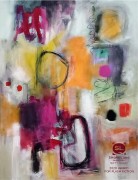In “Four Lies,” you tell the story of teenage cousins, three years apart, who are in love and seem to be trying to escape the reality of their home and family life. You divulge only a few select details about their realities, and I’m wondering how you decided which details to include—that the older cousin had lost his mother, for example, or the glass bottles the narrator’s father presumably throws at them in the tree house. How are these particular details essential to the plot and character development in your story?
I have a lot of faith in my reader, in her imaginative power. You might even say I tend to see a tiny story like this one as a collaborative act—a miniature world the two of us are building together. We’re co-authors.
Did you ever have a writing teacher tell you, “Show, don’t tell?” In the case of this story, I’m pushing back against that advice—not really trying to show or tell much at all, but simply making suggestions. And then I trust the reader to use those suggestions to people that world we’re building together … to fill it with color and light and shadow and sound, backstory and motivation.
If it works, then she fills the empty space with her own experiences: her own ill-fated teenaged romance and all the angst that came with it; her suffocating family dynamics; perhaps her terrifying brush with a half-cocked uncle who drank too much and strayed continuously close to chaos. My hope is that the details presented here are the suggestions needed for her to do the hard work of believing that this story could happen … and then she makes it happen, if only in her own imagination.
I appreciate your story’s structure—the sectioning off of the piece into four vignettes, each representing one of the four titular lies told and lived. How did the form for this piece come about?
I’m a sucker for long shots, tall orders and hard-to-swallow premises. So, when I thought about the challenge of distilling a years-long seduction into a few sharp, clear moments of deliberate self-deceit …. Well, let’s just say I couldn’t stop thinking about it.
It’s interesting character development to have the three-years-younger cousin be the one who is hesitant and less sure of the relationship, the one who, at the end of the story, is fifteen and seems to see past the current moment and understands the impossibility of their particular love in a way the college-bound cousin apparently does not. What is the significance of her reticence, and why did you choose to tell the story from her perspective rather than his?
I wanted a certain sense of thrill mixed with foreboding to ratchet up continually here, from the first sentence to the last, so it made sense to focus on a character who’s experiencing both that thrill and that fear, scene after scene. I don’t think her counterpart experiences much fear at all—he’s confident, maybe dangerously so. That kind of confidence is (very) attractive, but it doesn’t produce much narrative tension. It doesn’t live in tension at all.
Which writers who have influenced your work can you see reflected in this story? Or, perhaps, whose work might you be responding to in some way?
I’m not sure if I can say whether this story intended to respond to any one author in particular. What I can say is that its structure and size were a reaction against my own bad habit of letting stories get away from me … letting them get big and unwieldy and overgrown. This was a deliberate attempt on my part to take a machete to the underbrush, to hack a big story into a little space, making every scene count.
If you had to select the book that would be required reading/listening for every adult in the United States for the month of July 2020, what would it be?
That’s an easy one: Toni Morrison’s Beloved. I first encountered this one in college—at a time in my life when I was just beginning to ask myself why the racial tensions in America still felt so tense, and why our country’s history of slavery still felt so alive, so threatening. Beloved demanded that I actually attempt to answer those questions … and then it demanded that I ask myself where I fit into the answers. The book wrecked me on that first read, and it continues to disrupt me each time I return. I can think few books more appropriate for our current cultural moment.



 The core workshop of SmokeLong Fitness is all in writing, so you can take part from anywhere at anytime. We are excited about creating a supportive, consistent and structured environment for flash writers to work on their craft in a community. We are thrilled and proud to say that our workshop participants have won, placed, or been listed in every major flash competition. Community works.
The core workshop of SmokeLong Fitness is all in writing, so you can take part from anywhere at anytime. We are excited about creating a supportive, consistent and structured environment for flash writers to work on their craft in a community. We are thrilled and proud to say that our workshop participants have won, placed, or been listed in every major flash competition. Community works.